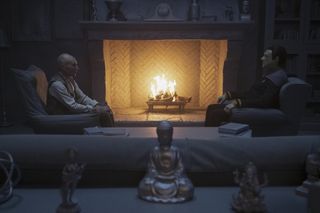
Warning: Spoilers ahead: If you haven't yet watched the first season of Star Trek: Picard and want to do so without having some fairly major plot points revealed, stop reading now. Otherwise, soldier on.
You've got to feel for anyone in command of Star Trek: Picard . Never mind the expectations of bringing back some of the most beloved (as well as reviled) characters in the larger Star Trek universe. Forget about the baggage any new crew will be bringing on board. Ignore the helpful suggestions from super fans and backseat bloggers. Any new Trek absolutely was going to be a big ship to steer.
The first season of Picard ended as unfulfilling as it was satisfying. It had us smiling and occasionally wiping away one of those weird things that comes from the corner of the eye as often as it caused an audible "What the fuck?!?!" (It's OK, you can curse now in the Trek universe.)

Shields up
Trek — and Picard — like you've never seen.
Should you watch it? If you're a Trek fan, absolutely, even if it's not (yet) a new classic.
It's hard to nail down the first season of Star Trek: Picard in a single sentence because it's a bit of a mess. There's a lot of nostalgia and a little bit of intrigue. It's a fun watch, if a bit busy and superficial.
Picard struggled because it tried to cram series-sized places and problems into a season-sized box. It was trying to be Battlestar Galactica in a mere 10 episodes — from the initial Cylon attack on the Twelve Colonies to the final goodbyes on prehistoric Earth. That'd be one hell of a story for anyone to attempt to tell in just 10 hours of television, and it's definitely not possible to really get inside any of the characters in that amount of time. You could easily see how Picard could have built from one season to the next. Instead we're done with Dahj far too quickly and turn to Soji instead. Two of the most fascinating characters — Picard's homestead helpers who happen to also be badassess — get little more than a single interesting scene. So much more time could have been spent on the Artifact. Or with the Romulan settlement. Or on Freecloud. Take your pick, really.
Picard was trying to do in a single season what Battlestar Galactica did in four-plus.
Some of the episode-level pacing can be waved away because in the 24th century we'll all be using transporters to hop from France to San Francisco and back before lunch, and we're all just going to have to come to grips with that reality. (It's very much the anti- Game of Thrones in that respect.) The good news is those of us in the real world will have a few hundred years to acclimate. And most of us don't really have a feel for the vastness of space and the actual speed of warp drives. (To say nothing of transwarp conduits.)
But Picard introduced us to a very new Trek reality. Sure, it shares the lineage and pedigree of some of the best of TNG and Voyager . (And as much as I'd love to have seen Wil Wheaton back as Wesley Crusher somehow, he's perhaps best at being himself in The Ready Room aftershow .) Picard is still very much based in the larger Trek universe — literally, figurative, and spiritually.
Picard is a very un- Trek -like show. Every series before it had its arcs, but none more better than when the Borg first entered the picture two thirds of the way through the second season of The Next Generation . (And to be sure, the Borg were far more than a temporary foil of an arc.) But this was back in the late 1980s and early '90s, and the syndicated series was enjoying a couple dozen episodes a season. (In fact, Season 2 was the shortest, with a mere 22 episodes.) Picard doesn't have the luxury. Even living online as it does, the run times for Picard still fit neatly inside of an hourlong show, and a mere 10 hours of storytelling just doesn't match up with the scope of the story being told.
Plus, F-bombs.




Star Trek: Picard had plenty of good moments drowned out by the noise.
That's not to say there weren't great moments. Sir Patrick Stewart really is as good as he's ever been. Jeri Ryan's return as Annika/Seven of Nine was excellent and added as much depth as any character did in this first season. Michelle Hurd and Santiago Cabrera have a lot left to explore as Raffi Musiker and Cristobal Rios — they barely got to scratch the surface. And the many faces of Isa Briones only got better the more we saw Dahj, Soji and then Sutra. Brent Spiner slips into the old Android suit as if he never took it off. Jonathan Del Arco brought new life to an Ex-B. And if you didn't love seeing the Marina Sirtis and Jonathan Frakes together again, what the hell are you even doing here?
But ultimately Picard also suffered from the same fate of so many other series — a real lack of jeopardy. Sure, we lost a couple legacy characters, but with Season 2 having been green-lit before Season 1 even premiered, we knew Jean-Luc wasn't going anywhere. We knew he wasn't going to die in the Roman Wild Wild West, and we knew he wasn't going to die at the hand of some synth-led, Thanos-scale invading army. (And for as much as I loved seeing Riker swoop in at the last minute, c'mon. Just, c'mon. ...)
Who knows where Season 2 will lead. Maybe Picard, in his new old body (or his old new body?), will find himself leaping from world to world, striving to put right what once went wrong.
Or maybe we'll just have to hold out hope for the Zhaban & Laris Power Hour.





